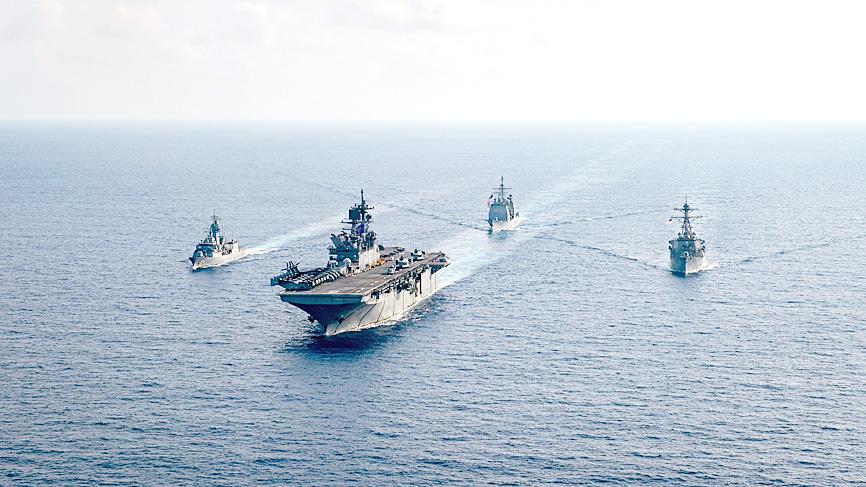The US is undertaking “strategic planning” with ally Australia to consider potential joint responses to a war over Taiwan, US President Joe Biden’s top diplomat in Canberra said yesterday.
“We’re committed as allies to working together — not only in making our militaries interoperable and functioning well together, but also in strategic planning,” Michael Goldman, charge d’affaires ad interim at the US embassy in Canberra, said in an Australian National University podcast, when asked about a potential role for Australia in a Taiwan contingency.
“And when you look at strategic planning, it covers the range of contingencies that you’ve mentioned, of which Taiwan is obviously an important component,” Goldman added.

Photo: Reuters
While Australia regularly hails its history of being involved in every major US conflict over the past century, it has yet to officially commit to taking part in a potential conflict over Taiwan.
The US also makes no iron-clad guarantees it will come to Taiwan’s defense if China makes good on threats to invade, only agreeing to help its capacity for self-defense.
China has stepped up military exercises around Taiwan over the past few years as Washington bolsters diplomatic ties with Taipei.
The comments risk inflaming US-China relations as Beijing hits back hard over criticism from Western countries over everything from allegations of forced labor in Xinjiang and cracking down on democracy advocates in Hong Kong to increased intimidation of Taiwan.
Chinese President Xi Jinping’s (習近平) government views all of them as “internal matters,” and has begun to lash out at companies that take a position on them.
China has also hit Australia with trade reprisals since Australian Prime Minister Scott Morrison’s government called for independent investigators to be allowed into Wuhan, China, to probe the origins of the COVID-19 pandemic a year ago.
US Secretary of State Antony Blinken this week said that Beijing “apparently helped to write” a WHO report studying the origins of COVID-19.
Goldman, who is heading the embassy until Washington replaces former US ambassador to Australia Arthur Culvahouse, who left in January, also backed up comments by US National Security Council Coordinator for the Indo-Pacific Kurt Campbell.
In a newspaper interview last month, Campbell said that US relations with China would not improve until Beijing stops its economic coercion against Australia.
Other nations including Japan, the Philippines and Vietnam have also been targeted with economic action by Beijing, he said.
“We really can’t expect to have substantial improvements in our relationship with China while it’s holding hostage the economies of our partner nations,” Goldman said.

MAKING WAVES: China’s maritime militia could become a nontraditional threat in war, clogging up shipping lanes to prevent US or Japanese intervention, a report said About 1,900 Chinese ships flying flags of convenience and fishing vessels that participated in China’s military exercises around Taiwan last month and in January have been listed for monitoring, Coast Guard Administration (CGA) Deputy Director-General Hsieh Ching-chin (謝慶欽) said yesterday. Following amendments to the Commercial Port Act (商港法) and the Law of Ships (船舶法) last month, the CGA can designate possible berthing areas or deny ports of call for vessels suspected of loitering around areas where undersea cables can be accessed, Oceans Affairs Council Minister Kuan Bi-ling (管碧玲) said. The list of suspected ships, originally 300, had risen to about 1,900 as

Japan’s strategic alliance with the US would collapse if Tokyo were to turn away from a conflict in Taiwan, Japanese Prime Minister Sanae Takaichi said yesterday, but distanced herself from previous comments that suggested a possible military response in such an event. Takaichi expressed her latest views on a nationally broadcast TV program late on Monday, where an opposition party leader criticized her for igniting tensions with China with the earlier remarks. Ties between Japan and China have sunk to the worst level in years after Takaichi said in November that a hypothetical Chinese attack on Taiwan could bring about a Japanese

Right-wing political scientist Laura Fernandez on Sunday won Costa Rica’s presidential election by a landslide, after promising to crack down on rising violence linked to the cocaine trade. Fernandez’s nearest rival, economist Alvaro Ramos, conceded defeat as results showed the ruling party far exceeding the threshold of 40 percent needed to avoid a runoff. With 94 percent of polling stations counted, the political heir of outgoing Costa Rican President Rodrigo Chaves had captured 48.3 percent of the vote compared with Ramos’ 33.4 percent, the Supreme Electoral Tribunal said. As soon as the first results were announced, members of Fernandez’s Sovereign People’s Party

MORE RESPONSIBILITY: Draftees would be expected to fight alongside professional soldiers, likely requiring the transformation of some training brigades into combat units The armed forces are to start incorporating new conscripts into combined arms brigades this year to enhance combat readiness, the Executive Yuan’s latest policy report said. The new policy would affect Taiwanese men entering the military for their compulsory service, which was extended to one year under reforms by then-president Tsai Ing-wen (蔡英文) in 2022. The conscripts would be trained to operate machine guns, uncrewed aerial vehicles, anti-tank guided missile launchers and Stinger air defense systems, the report said, adding that the basic training would be lengthened to eight weeks. After basic training, conscripts would be sorted into infantry battalions that would take